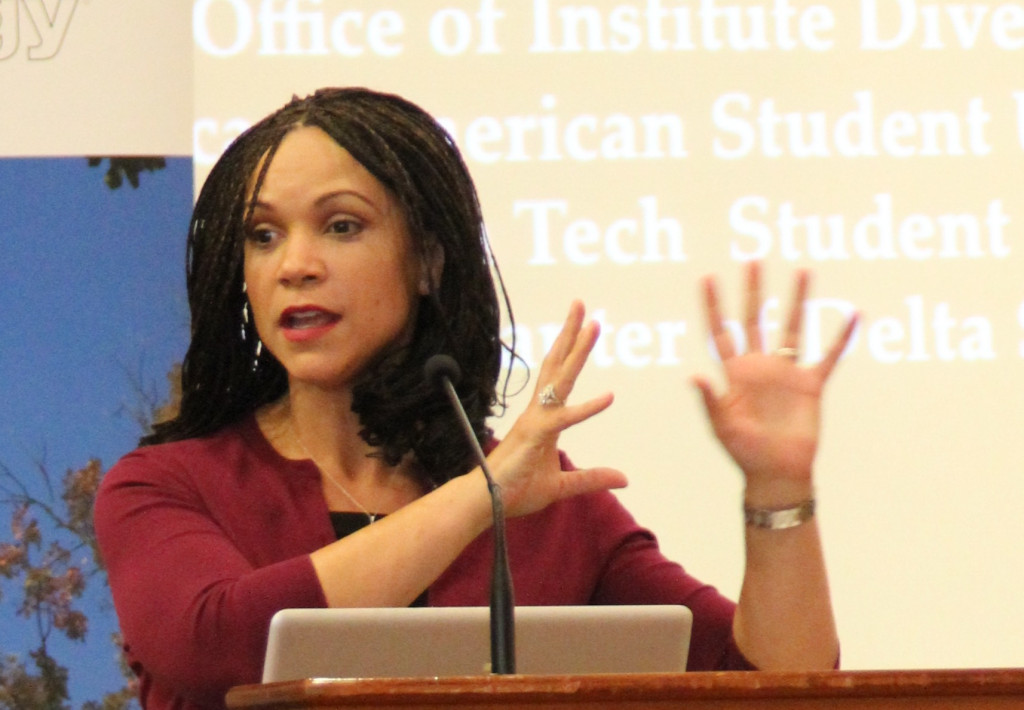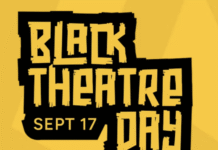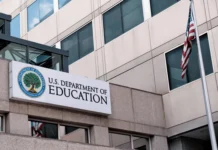
(Photo Credit: TJ Funso/TJ Photography)
New leaders and activists of today should educate themselves on the past in order to make social change in contemporary America says Tulane University political science professor Dr. Melissa Harris-Perry. Harris-Perry is also host of her self-titled weekend news program on MSNBC.
The dynamic, provocative public intellectual was named Georgia Tech’s Inaugural Black History Month Distinguished Lecturer. Fresh from lecturing to a class on campus, Dr. Harris-Perry, used her brand of wit, scrunched facial expressions, hand mannerisms and instructor-styled demeanor to enlighten the audience at the podium.
The astute speaker reiterated her motto, “The struggle continues.” She encouraged the primarily African American student audience to take action on campus, in their local communities and with emerging technologies. She believes that their presence and initiative in those areas can set the tone for evolving into effective citizens. “You have the capacity to love and critique at the same time. Young people develop culture. We have to let them lead it. They allow us to see things we don’t always see. It takes having a voice and not being silenced. You have the right to make mistakes and still be a valued contributor,” says Dr. Harris-Perry.
During Dr. Harris-Perry her address, the best-selling author, historian and columnist for The Nation made a few Biblical and pop cultural references. She was accompanied by a slideshow of powerful photographs featuring beaten slaves, protestors with picket signs and blacks being lynched. “You have to be able to lose without fear. Struggles are interconnected in a global environment. Securing rights has required struggle. Struggles are real, but they’re embodied,” says Dr. Harris-Perry.
As the slides transitioned, Dr. Harris-Perry suggested that the audience divert their attention from the obvious images that trigger thoughts of injustice. She set the audience up to identify complex ways of understanding how oppression affects all people. “We do what we know to do. So much of the movement looks like what we think it’s supposed to look like. We have to participate in knowing how to change things,” says Dr. Harris-Perry.
Leading a movement requires teamwork and recognizing that there is a problem. With the help of another photograph, Dr. Harris-Perry recalls one of her students helping to rebuild and gut homes in New Orleans post-Katrina. There were subsequent images of race-related headlines like Jena Six, Trayvon Martin and Troy Davis. Dr. Harris-Perry wanted students to know the battles they face in contemporary society, which she framed in a historical context.
Education, she says, is key to raising awareness. “You have to do the work of democracy in the classroom first. Classrooms are labs for democracy. Movements require collaborators, challenges and active action. Civil rights is the wrong way to think about struggle,” says Dr. Harris-Perry.
Dr. Harris-Perry, the founding director of The Anna Julia Cooper Project, segues briefly into discussing Dr. Martin Luther King’s role in the movement. She doesn’t portray him as a singular messiah as historic accounts would often suggest. Instead, she meticulously illustrates how his vision for equal rights and nonviolence had some assistance from some of the movement’s unsung heroes like Ella Baker, Fannie Lou Hamer, Bayard Rustin, Diane Nash and A. Philip Randolph.
Despite gender, sexual orientation or political party affiliation, they were crusaders who allied with or critiqued King’s ideologies. Movement, she insists, requires various perspective and ideas to work towards common goals. “We misremember the struggle in important ways. Strong people don’t need strong leaders. It’s our collective rhetorical tool that achieves inequality,” says Dr. Harris-Perry. Her slideshow then transitioned into a photo of the little boy patting President Obama on the head. Not too far behind were images of news headlines matched with her reading critiques of President Obama’s agendas and policies.
When Harris-Perry talks about President Obama, she admits that she gets emotional. Dr. Harris-Perry adds, “We live in that moment for the baton passing. An African American President absolutely matters,” she says.
The humble scholar, considered by many as one of America’s foremost public intellectuals, also shares with the audience her personal battles. Dr. Harris-Perry is trying to wrap up her third book. She recognizes her hectic travels keep her away from home quite often. Affected slightly by dyslexia, she has problems reading the teleprompter during the taping of her show.
Despite her struggles, Dr. Harris-Perry knows diverse youth have the power to make social change. Students, she says, must be up for the challenge despite their career choices. “Being a citizen is to participate in something messy and hard. While you’re a scientist or engineer, be an artist. They respect no arbitrary boundary and refuse to be invisible or silenced. They are deeply invested in community, make order out of chaos and chaos out of order,” she says.
Christopher A. Daniel is pop cultural critic and music editor for The Burton Wire. He is also a contributing writer for Urban Lux Magazine and Blues & Soul Magazine. Follow Christopher @Journalistorian on Twitter.
Like The Burton Wire on Facebook. Follow us on Twitter @TheBurtonWire.








